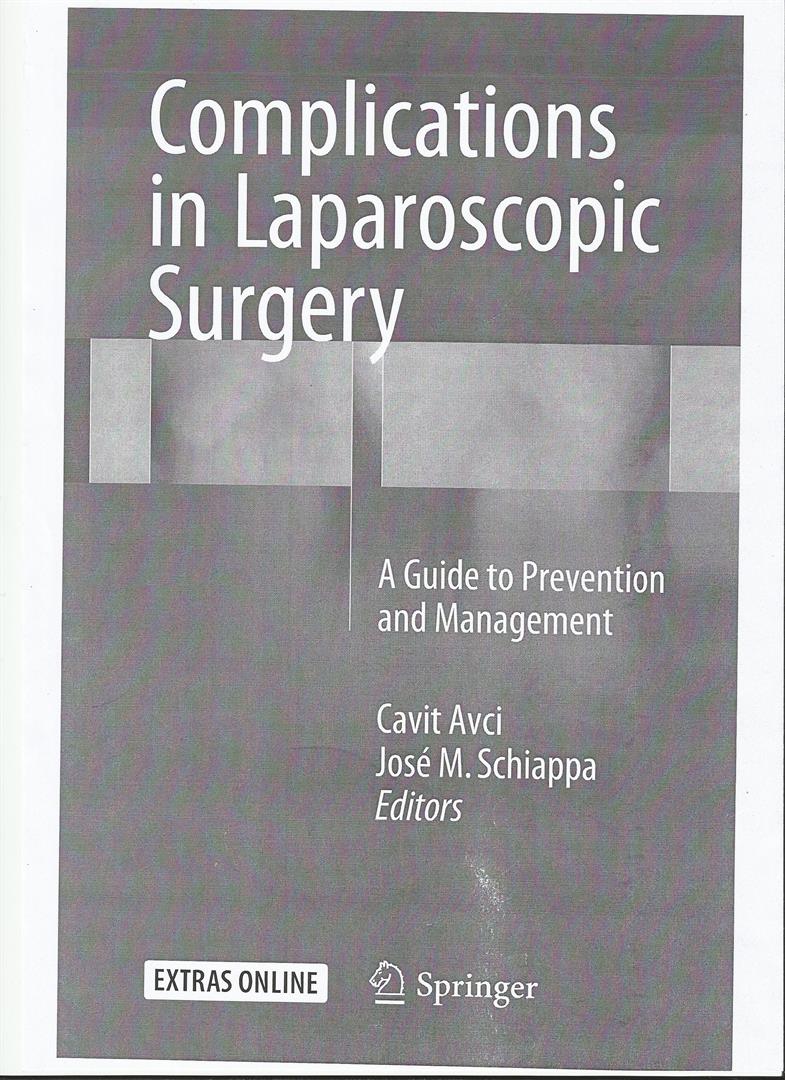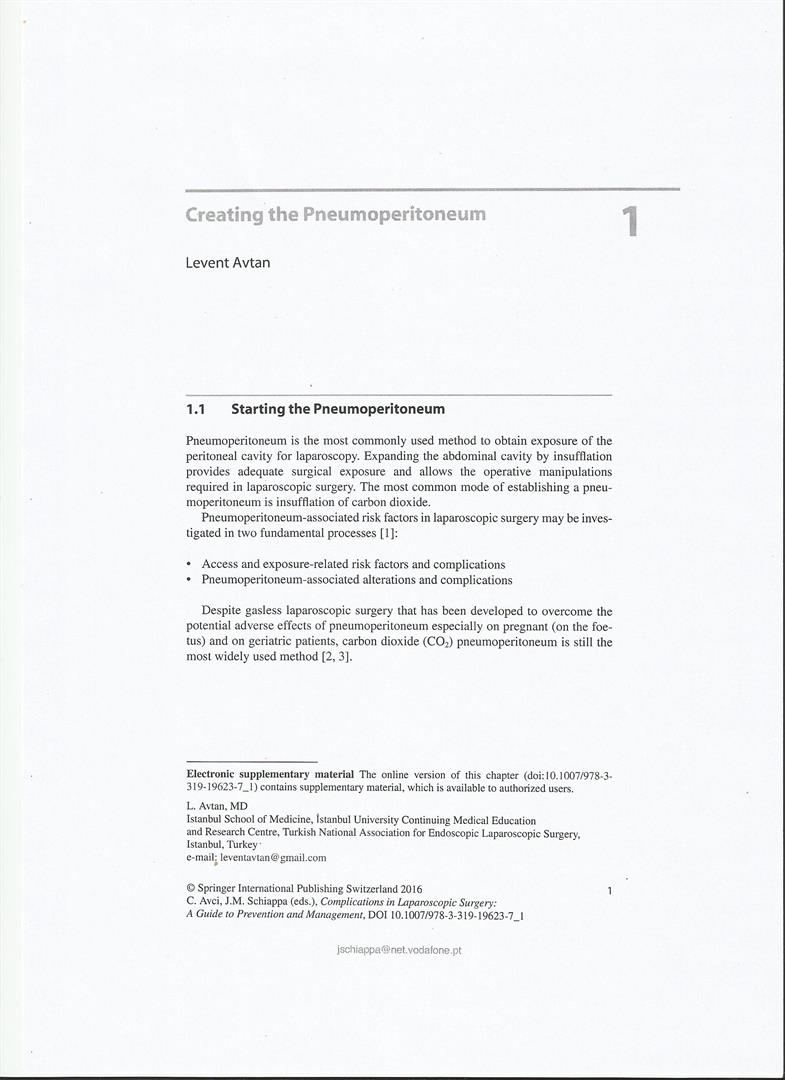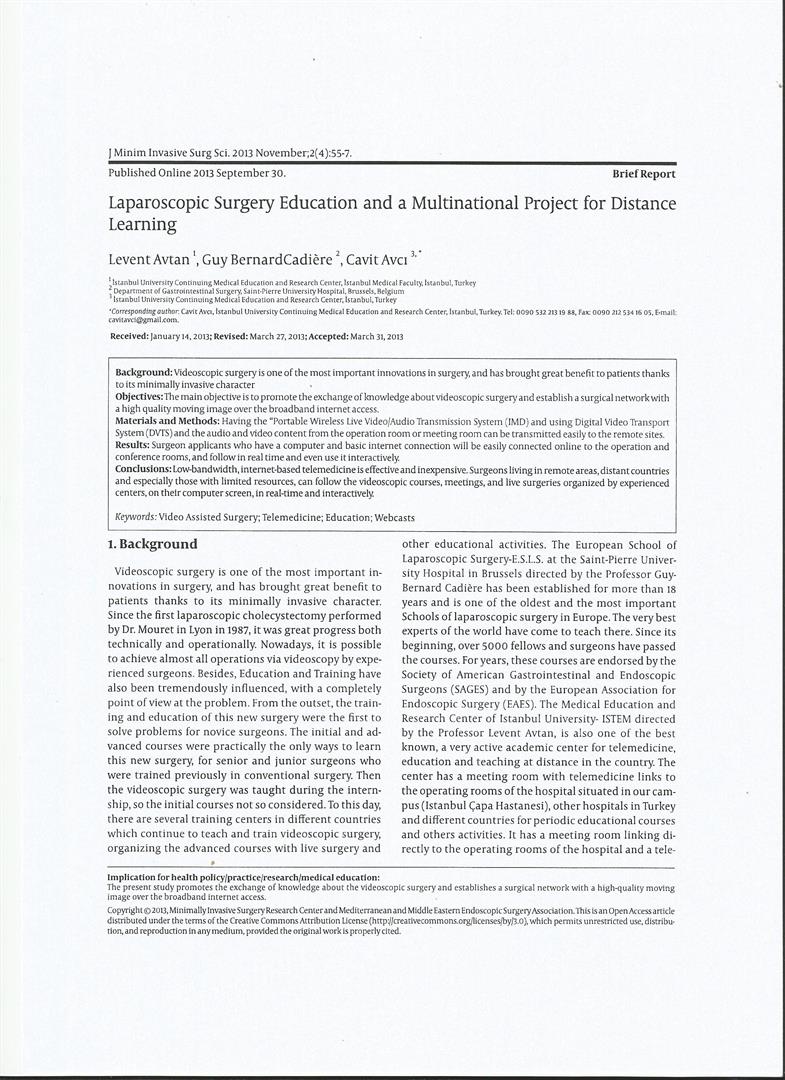The Marmara Oteli, İSTANBUL
5-8 Haziran 1994 / İSTANBUL
IV.AVRUPA VİDEO CERRAHİ KONGRESİ
Düzenleyen Kuruluşlar:
European Association of Video-Surgery-A.E.V.C
Odiyo-Vizüel Uygulama ve Araştırma Merkezi – ODVİM
Kongre Başkanı: Prof.Dr.Cavit AVCI
Kongre Sekreteri: Dr.Levent AVTAN
Destekleyen Kuruluşlar:
European Society for Endoscopic Surgery-E.A.E.S
Endoskopik Laparoskopik Cerrahi Derneği- E.L.C.D
İstanbul Tıp Fakültesi Genel Cerrahi Anabilim Dalı
Association Français de Chirurgie-A.F.C
Eurosurgery
Ulusal Cerrahi Derneği
Fondation Pour le Developpement dela Chirurgie Laparoscopique-
FDCL
Video Revista de Chirurgia-VRC
International Gastro-Surgical Club
Medico-Surgical Audio-Visual International Decumentation and
Education Center-MOVİDEM
Societe Française de Chirurgie Endoscopique- SFCE
Davetli Yabancı Konuşmacılar:
Fransa, USA, Belçika İsrail, Portekiz, Yunanistan, İspanya,
İtalya, Avusturya, Almanya, Hollanda, İsviçre, İngiltere
Toplam Katılımcı Sayısı:
13 ülkeden, 37 Davetli Konuşmacı olmak üzere toplam 19
ülkeden 200 civarında yabancı katılımcı ile birlikte ~ 500
katılımcı
22-25 Ekim 2003
6.Ulusal Endoskopik-Laparoskopik Cerrahi Kongresi – 22 Ekim 2003
3rd Mediterranean & Middle Eastern Endoscopic Surgery Congress – 22-25 October 2003
Istanbul HiltonConvention Center / İSTANBUL
– İstanbul Tıp Fakültesi Hastanesi, Cerrahpaşa Tıp Fakültesi Hastanesi, CHU-EITS Strasbourg, İtalya – F.Agostino Hosp. Modena ve Brüksel -St.PierreHospital ile
İnteraktif ve Canlı Ameliyat Yayınları
Organizasyona Katılan Kuruluşlar;
– E.L.C.D – Ulusal Endoskopik – Laparoskopik Cerrahi Derneği
– MMESA – Mediterranean& Middle Eastern Endoscopic Surgery Association
– İ.Ü Sürekli Tıp Eğitimi Araştırma ve Uygulama Merkezi
– İ.Ü İstanbul Tıp Fakültesi
– İ.Ü Cerrahpaşa Tıp Fakültesi
– Belçika, Free University ofBrussels–Saint PierreHospital
– CHU, EITS,Strasbourg
– İtalya, F.Agostino Hosp. Modena
05 Eylül 2013 İSTEM/Kadın Doğum “SGI Summit Turkey” Laparoskopik Cerrahi Kursu
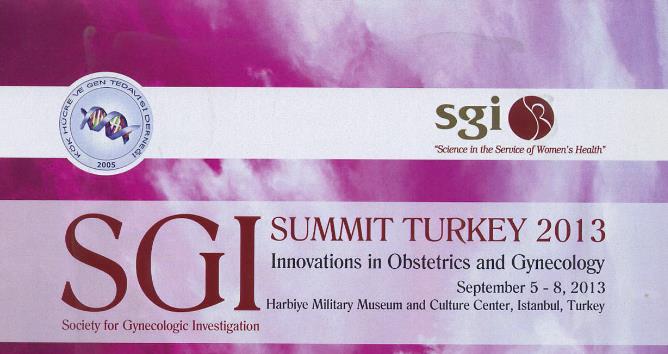
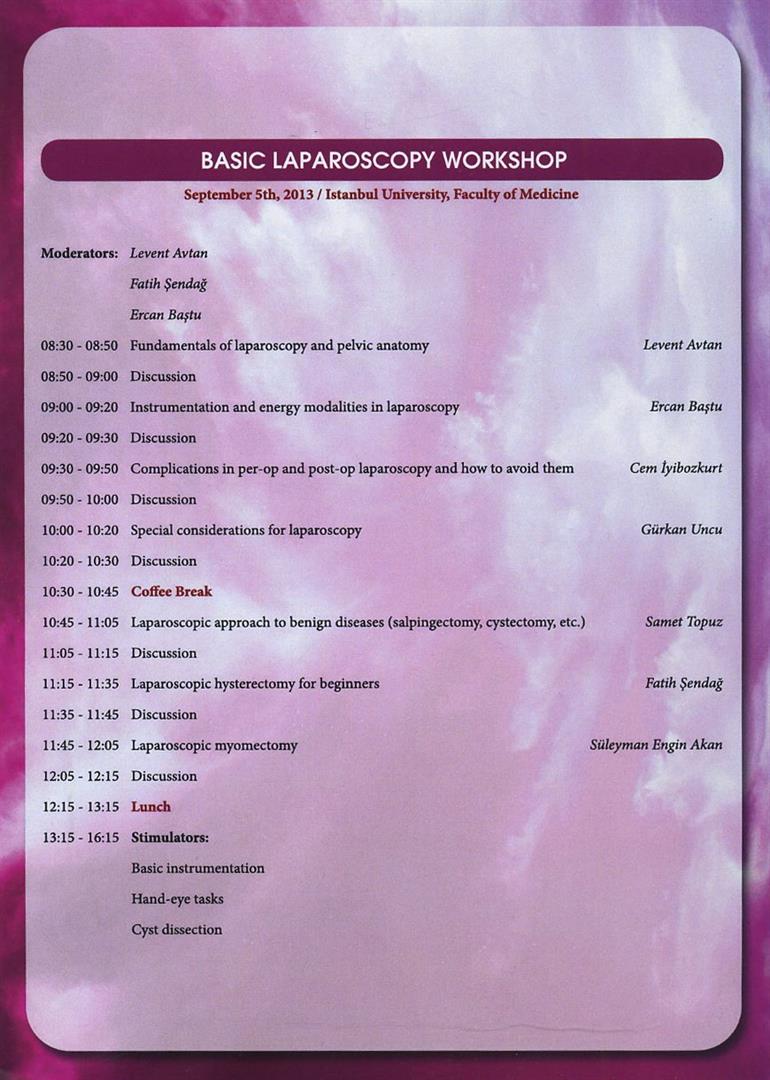
9 Mayıs 2013 İSTEM/Genel Cerrahi “European Digestive Surgery”Lap.Cerahi Kursu
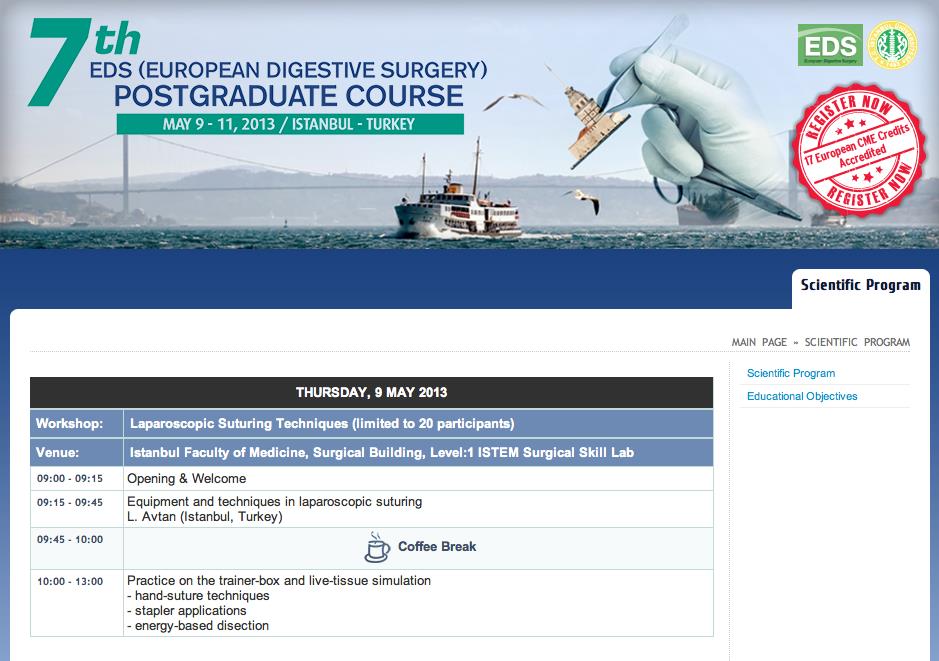
Istanbul, 12-13 June 2008 NETADDED FIRST ANNUAL REVIEW
17-18 November 2006 1st Regional Workshop on Telemedicine in the Black Sea
Region. İstanbul
16-18 Eylül 2004
Infrastructures for the Virtual Euro-Mediterranean Hospital
EMISPHER International Dissemination Conference
“Best Practice in Real-Time Telemedicine” (16-18 September 2004)
Yurtiçi – ISDN ile Telekonferans (Erzurum)
Yurtdışı -WINVICOS ile Telekonferans(Tunus,Almanya,Cezayir,Fransa)
01-03 Nisan 2000
I.Ulusal Telemedicine Sempozyumu
Fransa/Strasburg –Cerrahpaşa Oditoryum
Prof.Dr.Marescaux’un Telemedicine Tanıtım Konferansı
(Strasburg ‘dan Canlı yayın)
New Technologies to Avoid Digital Division in e-Divided areas
Project summary
NeT-ADDeD aims at developing and validating technical features improving performance of deployment and operation of hybrid satellite-wireless technologies, in coherence with the growing demand of broadband communications in the INCO countries, as well as with their evolution in Europe.
These axes of technical activities take benefit from feedbacks provided by the user communities involved in the TWISTER project.
Two main types of activities will enable to improve the performance of deployment, namely:
Specification, implementation and validation of self-installation process usable by customers
The implementation of compact and robust transportable DVB-RCS terminals, easy to deploy and adapted to field conditions of INCO countries
Three main axes will enable to improve conditions of exploitation, namely:
The development and validation under real conditions of remote satellite control capabilities, for reduction of operating costs, in terms of monitoring and maintenance.
The development and validation of mechanisms of service differentiation on the satellite component.
The integration and validation of standardized satellite solution with innovative wireless technologies, providing better throughput, coverage and robustness capabilities.
Performance evaluation will be performed in laboratory and under real conditions by deploying validation sites in representative INCO countries of North and Central Africa, as well as inTurkey,CambodiaandEurope. Representative user communities will cover the domains of Healthcare, Education, Agriculture, Tourism and Corporate customers.
Dissemination activities within conferences, regulation and standardization workgroups will allow to capitalize on the experience gained in NeT-ADDeD, for the benefit of other user communities.
Euro-Mediterranean Internet-Satellite Platform
for Health, medical Education and Research
1.1 Project Summary
The proposed project is addressing the objectives of Sector 1 of the EUMEDIS pilot projects programme: Euro-Mediterranean Healthcare networks.
The project is aiming at :
establishing an equal access, for all countries of the Euro-Mediterranean area, to the quality of service which is required for the delivery of on-line services for health care,
in order to widely promoting and disseminating high priority application services,
and developing a sustainable economic model for a minimum set of quality services
In a recent attempt, the WHO (World Health Organization) has addressed the concerned Internet body to obtain the creation of a new domain name extension (such as .com or .edu) dedicated to health, to ensure a minimal quality of service. Although unsuccessful, this endeavour illustrates a demand which is constant and widespread throughout the worldwide medical community for a technical quality of service.
The project is putting together the cutting edge European technology developed in the frame of previous EU funded projects, to provide an integrated Internet and Satellite platform, dedicated to health applications, and covering the whole Euro-Mediterranean area. Mature satellite technologies as shown in the very successful EU project GALENOS,can becost-effective if combined with appropriate internet application services, to guaranty the required bandwidth when and were it is required, and therefore achieve the required quality of service (response time, quality of video transmissions and large medical records, synchronisation of databases etc ….).
Thanks to the advances performed in previous projects (ET-ASSIST, HC1016 – GALENOS, # 45592- TEN-TELEMED, # 45653) and to additional industrial investments, such a platform will be available right from the beginning of the project.
According to the acknowledged priorities[1] confirmed by the consortium participants from the non EU countries, and in relation with various national initiatives, three priority applications will be hosted :
[1] See paper presented by Dr. Najeeb Al-Shorbaji from the Regional Office for the Eastern Mediterranean World Health Organisation, at the seminar on ‘Information Technology in Health Care’ organised in Cairo, 18-19 April 2000, and the ITU report “Telemedicine and Developing countries”, ITU/BDT Report, October 1997, Rapporteur: David Wright.
e-learning applications to develop the concept of cross-Mediterranean Virtual Medical University; establish a permanent medical and scientific link and contribute to limit corresponding emigration flows
real-time telemedicine applications for remote expertise and 2d opinion and foster cross-Mediterranean cooperation at expert level or for research.
shared management of the medical assistance file in case of repatriation of travellers or expatriates, a service which is expected to significantly contribute to the continuity of care throughout the whole Euro-Mediterranean arc. In most of the countries of the Mediterranean arc, tourism constitutes a major source of income and Europeans constitute the main cohort of foreign visitors. Improving the image of medical care in relation with tourism is considered of major interest, particularly as an increasing number of ageing populations is travelling.
A network of 10 expert centres (Medical faculties and leading hospitals) will be permanently interconnected and create a network of contributing medical centres able to foster the widest cooperation in the long term. These centres will be equipped with bi-directional satellite terminals enabling a permanent mesh connection between the various regional areas of up to 2Mbps. It is the intention of the project to extend this network to up to 25 centres, on the basis of public regional or private initiatives.
These centres will work as “hub” centres for a wider network, built on the existing cooperation in the medical assistance area, constituted of 250 medical centres. These centres will be interconnected using a technology demonstrated in project ET-ASSIST (European Telemedicine for Medical Assistance) enabling the exchange of multimedia patient record elements and the electronic management of the workflow in relation with medically assisted repatriations.
Awareness of the users, exchange of experiences and dissemination, training of a large number of users will be organized mainly through 4 major international events funded by the project and organized inMorocco,Cyprus,EgyptandTurkey. Such events will be opened to the widest medical community.
The consortium as a whole, under the auspices of the independent not-for-profit organisations (EHTEL, European Society for e-Learning in Medicine), will study a financial model to enable operations of a minimum set of quality services offered by the platform on (1) a financially sustainable manner and (2) at a cost acceptable by the widest mass of users.
A part of the required funding is already guaranteed, as the medical assistance activity will be financed, in the long term, by the assistance companies and provided for free to the hospitals en clinics adhering to it.




